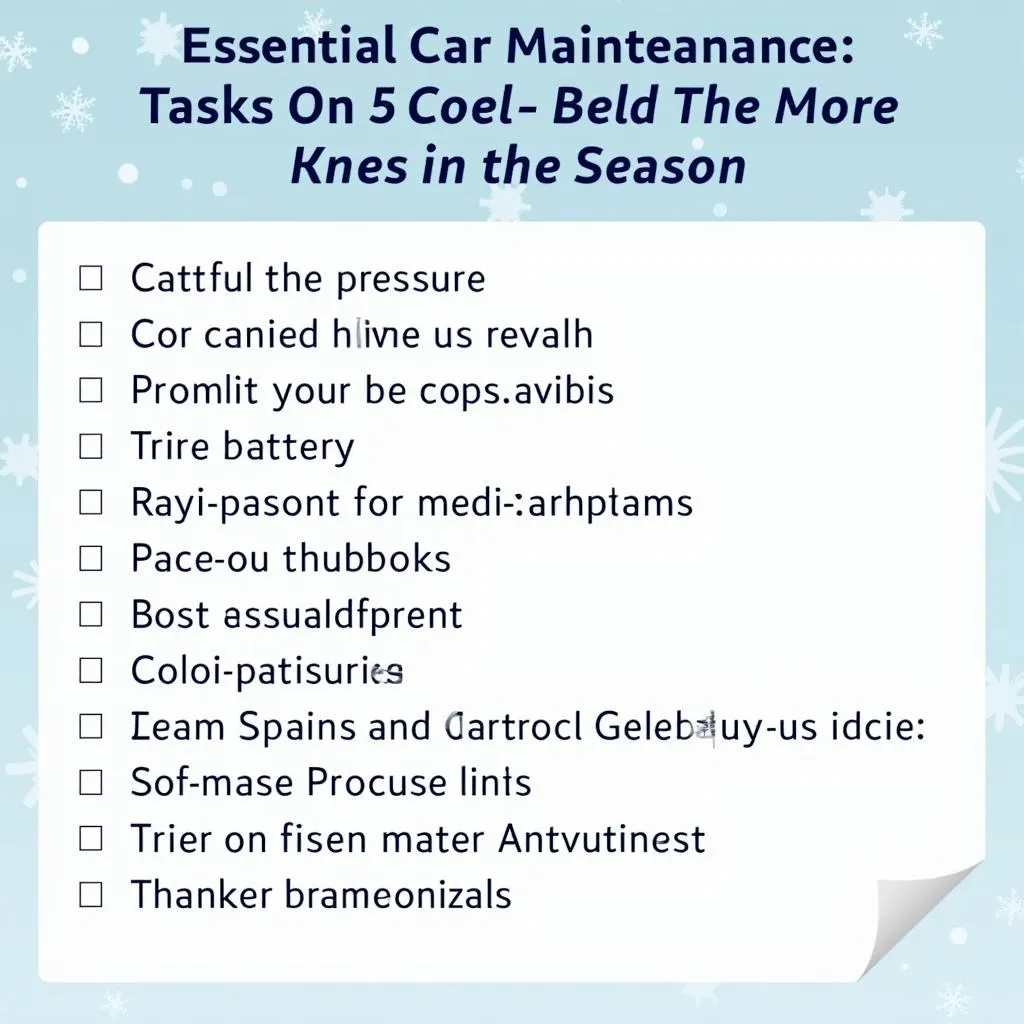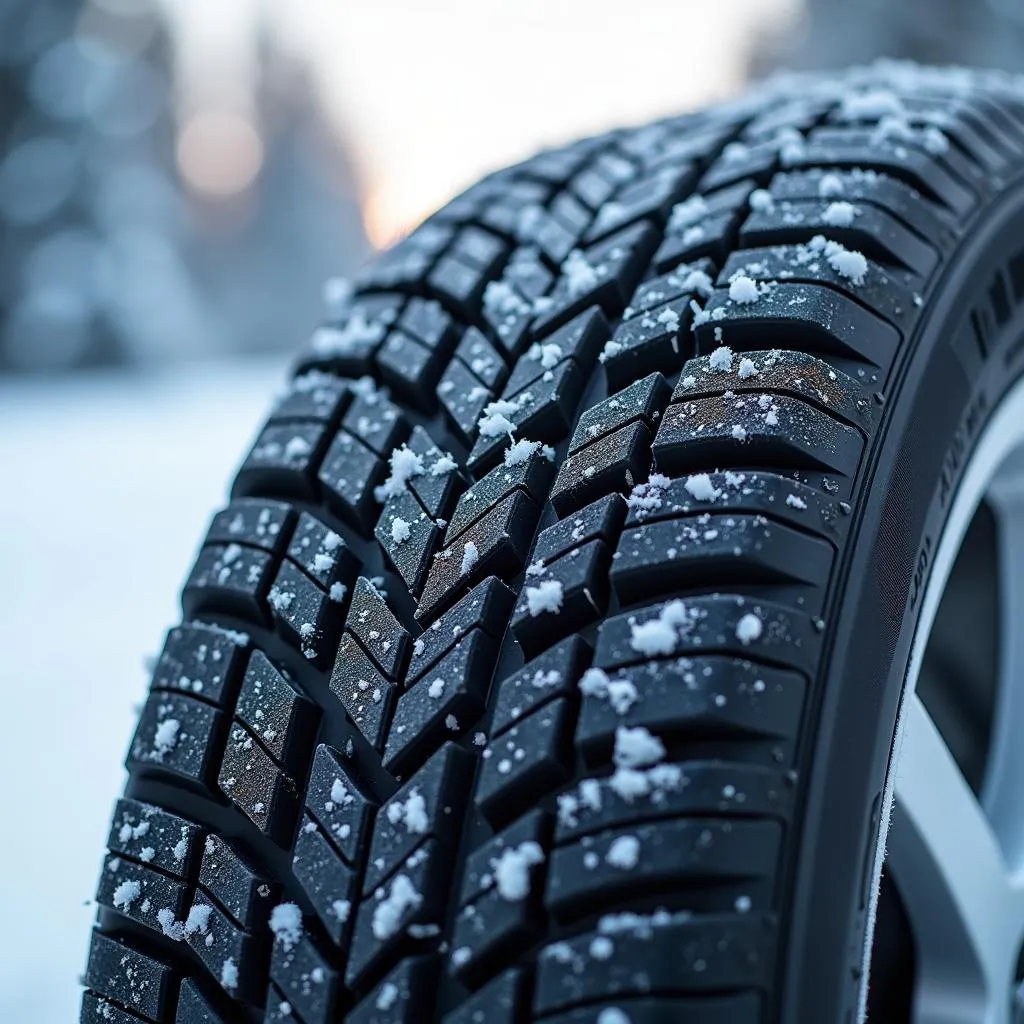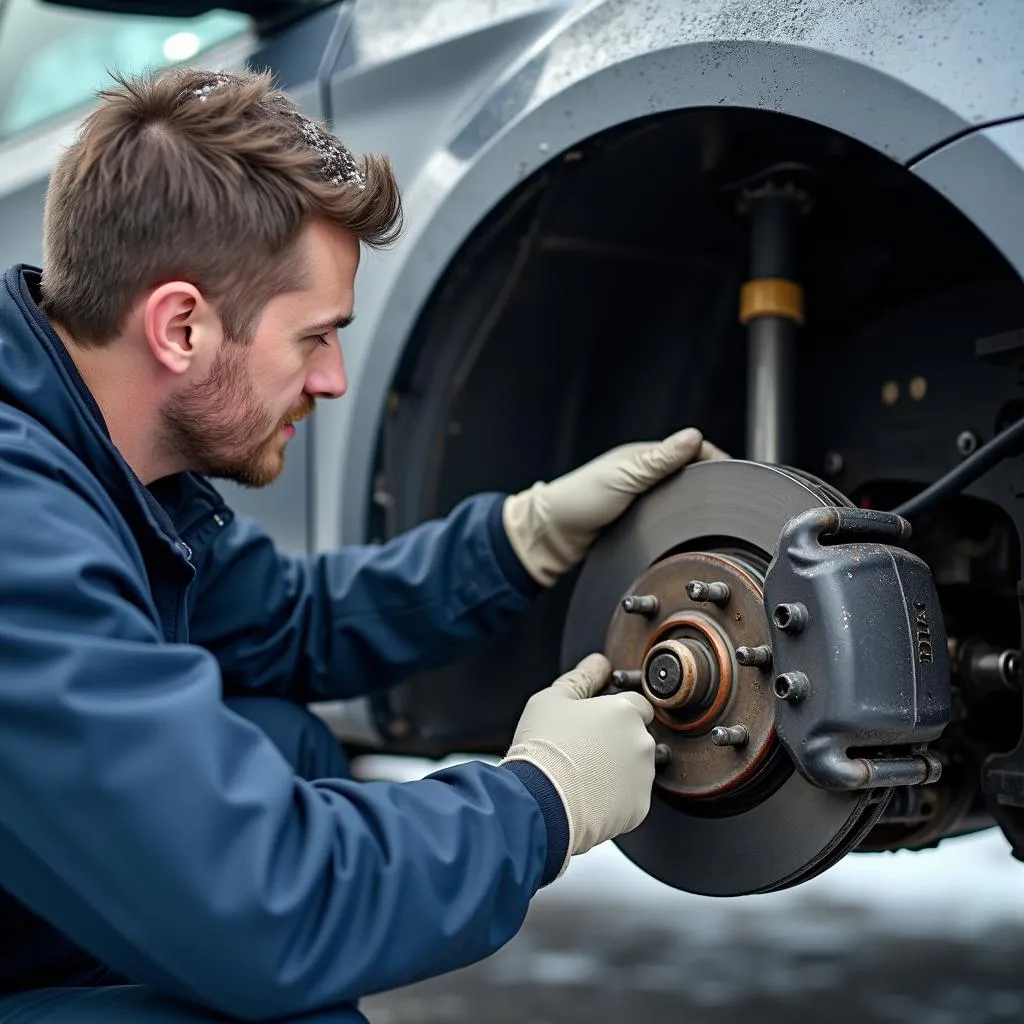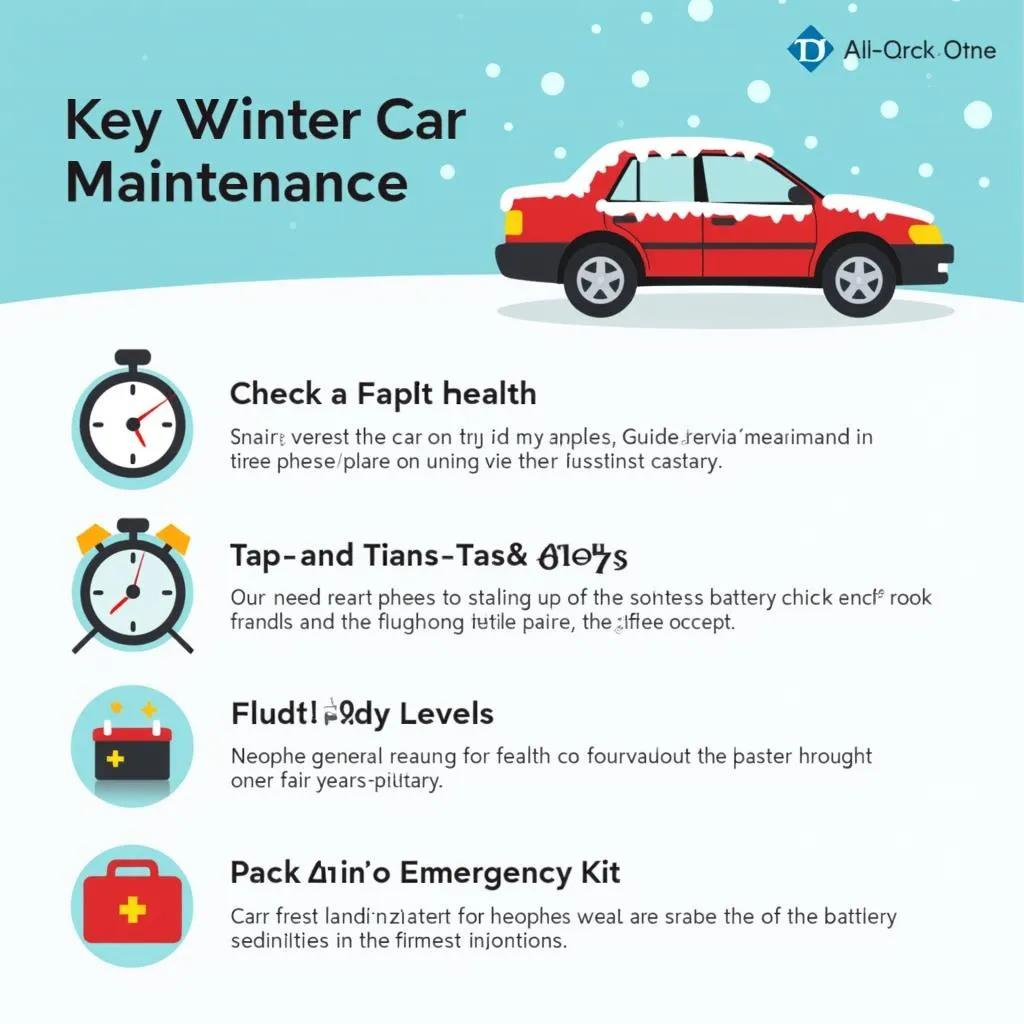Winter is coming, and with it comes harsh conditions that can take a toll on your vehicle. Before the snow flies and the temperatures plummet, it’s essential to prepare your car for the challenges ahead. Addressing potential issues now can save you headaches, costly repairs, and ensure your safety on icy roads.
But where do you begin? Don’t worry, we’ve got you covered. This comprehensive guide will walk you through the essential auto services you should consider before winter’s chill sets in.
Essential Winter Car Maintenance: Protect Your Vehicle From the Cold
Think of preparing your car for winter like dressing yourself for a blizzard – you need multiple layers of protection.
 Winter Car Maintenance Checklist
Winter Car Maintenance Checklist
Here’s a breakdown of the crucial areas to address:
1. Battery Check and Maintenance: Don’t Get Left Out in the Cold
Cold temperatures can significantly reduce your battery’s cranking power, making it more likely to fail on a frigid morning.
- Battery Test: Have a mechanic test your battery’s charge and cold cranking amps (CCA) to assess its health.
- Battery Replacement: If your battery is nearing the end of its lifespan or shows signs of weakness, consider replacing it proactively.
- Clean Connections: Ensure your battery terminals are clean and free of corrosion for optimal performance.
2. Tire Inspection and Replacement: Get a Grip on Winter Driving
Your tires are your only point of contact with the road, making their condition paramount in winter weather.
- Tread Depth: Check your tire tread depth. If it’s below the recommended level, consider replacing your tires, especially if you live in an area with heavy snowfall.
- Tire Pressure: Cold weather causes tire pressure to drop. Inflate your tires to the recommended PSI (check your owner’s manual or the sticker on your driver’s side door jamb).
- Consider Winter Tires: If you live in an area with frequent snow or ice, invest in winter tires. These tires are specifically designed for optimal grip and traction in snowy and icy conditions.
 Winter Tires for Snow Traction
Winter Tires for Snow Traction
3. Fluids Check and Top-Up: Keep Your Engine Running Smoothly
Maintaining proper fluid levels is crucial for your vehicle’s performance and longevity, especially during the winter months.
- Antifreeze/Coolant: Ensure your antifreeze/coolant mixture is at the correct concentration to prevent freezing in cold temperatures.
- Oil Change: Consider switching to a winter-grade oil if you live in a particularly cold climate, as it flows better in low temperatures.
- Windshield Washer Fluid: Use a winter-specific windshield washer fluid with a lower freezing point to effectively clear ice and snow from your windshield.
4. Heating System Inspection: Stay Warm and Defrost Safely
A properly functioning heating system is essential for comfort and visibility during the colder months.
- Heater Core: Have your mechanic inspect the heater core for leaks or clogs to ensure efficient heat distribution.
- Defroster: Test your front and rear defrosters to make sure they’re working correctly for optimal visibility.
5. Brakes Inspection: Stop Safely on Slippery Surfaces
Having your brakes in optimal condition is critical for safe winter driving.
- Brake Pads and Rotors: Have your brake pads and rotors inspected for wear and tear. If they’re nearing the end of their lifespan, have them replaced.
- Brake Fluid: Check your brake fluid level and condition. Brake fluid can absorb moisture over time, reducing its effectiveness.
 Car Brake Inspection for Winter
Car Brake Inspection for Winter
6. Lights Check: See and Be Seen in Winter Darkness
Visibility is crucial during the shorter daylight hours of winter.
- Headlights, Taillights, and Brake Lights: Ensure all lights are working correctly and replace any burnt-out bulbs.
- Aim Adjustment: Have your headlights properly aimed to ensure optimal visibility without blinding oncoming drivers.
7. Wiper Blades Replacement: Maintain Clear Visibility
Worn-out wiper blades can leave streaks and reduce visibility, especially during winter precipitation.
- Wiper Blade Condition: Inspect your wiper blades for cracks, tears, or stiffness. Replace them if they’re not cleaning your windshield effectively.
- Consider Winter Wiper Blades: Winter wiper blades are designed to handle heavier snow and ice buildup.
8. Emergency Kit Check: Be Prepared for Winter Roadside Emergencies
It’s always wise to be prepared for unexpected situations, especially during the winter months.
- Emergency Kit Essentials: Stock your car with an emergency kit that includes a flashlight, extra batteries, jumper cables, a blanket, non-perishable snacks, water, a first-aid kit, and a snow scraper.
Don’t Wait for Winter’s Chill: Schedule Your Pre-Winter Car Service Today!
Taking the time to prepare your vehicle for winter is an investment in your safety and peace of mind. By addressing potential issues before they become major problems, you can enjoy a smoother and safer driving experience throughout the colder months. Schedule an appointment with a trusted mechanic today to ensure your car is ready to tackle whatever winter throws its way.
FAQs: Your Winter Car Maintenance Questions Answered
Q: How often should I check my tire pressure in the winter?
A: It’s recommended to check your tire pressure at least once a month during the winter months. Remember, tire pressure decreases in cold weather.
Q: Why is it important to have my battery checked before winter?
A: Cold temperatures can significantly reduce your battery’s cranking power. A weak battery is more likely to fail in cold weather, leaving you stranded.
Q: Do I really need winter tires if I have all-season tires?
A: While all-season tires offer decent performance in a variety of conditions, winter tires provide superior grip and traction on snow and ice, significantly improving safety in winter driving conditions.
Q: What should I do if my car breaks down in winter weather?
A: Stay with your vehicle, turn on your hazard lights, and call for roadside assistance. If possible, try to pull your vehicle as far off the road as possible to avoid being hit by other vehicles.
Q: How often should I get an oil change in the winter?
A: It’s generally recommended to follow your vehicle manufacturer’s recommended oil change intervals. However, if you frequently drive in extreme cold, consider shorter intervals.
 Essential Winter Car Maintenance Tips
Essential Winter Car Maintenance Tips
Explore More Winter Car Care Tips
For more detailed information and expert advice on keeping your car in top condition throughout the winter season, explore our other informative articles:
- [Link to article about winter tires]
- [Link to article about car battery maintenance]
- [Link to article about winter driving safety]
Need Expert Assistance? We’re Here to Help!
Contact us today for all your auto service needs this winter!
WhatsApp: +1(641)206-8880
Email: [email protected]
Our dedicated team of auto service professionals is available 24/7 to assist you with any questions or concerns you may have. Drive with confidence this winter!

Leave a Reply